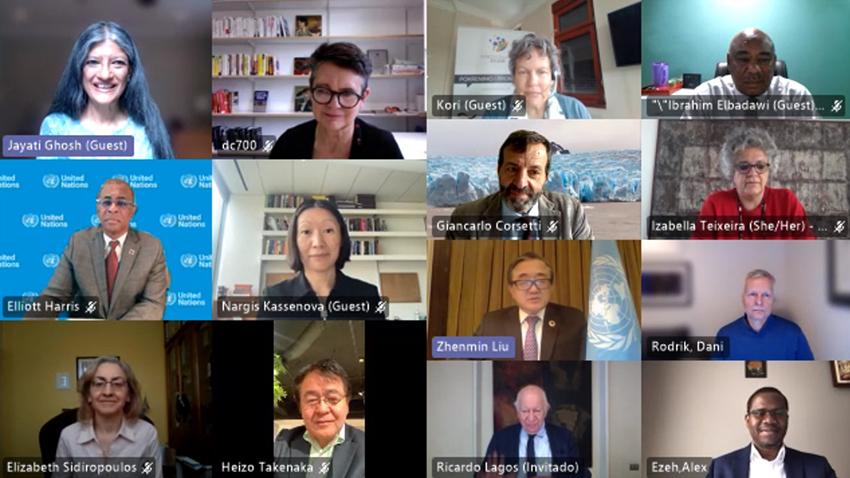In September 2021, top economists, global thought leaders and former Heads of State and Government came together for the second meeting of the High-level Advisory Board on Economic and Social Affairs to discuss solutions to rampant inequalities, runaway climate change and other pressing challenges facing the world.
The Board examined topics such as financing for development, economic insecurity, a just transition to a carbon-neutral future and resilience-building for future crises, and zeroed in on the latest report of UN Secretary-General António Guterres, “Our Common Agenda.” Released on 10 September 2021, the report lays out the UN vision for the future of global cooperation across 12 areas that will make a tangible difference for people and planet.
“The report is an inspirational and aspirational document, tackling the most pertinent and challenging issues of our time, while providing a clear and concrete roadmap from both a content and a process perspective,” said Elizabeth Sidiropoulos, Chief Executive of the South African Institute of International Affairs.
In support of this new vision, the Board discussed and proposed recommendations on the role of the UN as a standard setter for understanding and monitoring development gains. In doing so, the Board recognized the need to improve the GDP measurement to assess growth and development more comprehensively, and better tie economic policies to structural needs and goals.
The Board members also highlighted the importance of shifting away from short-termism and engaging people in the process of long-term strategic thinking to realize Our Common Agenda. Izabella Teixeira, former Minister of Environment of Brazil said, "There is difficulty in today's world for countries to believe in long-term thinking. The report is important as it highlights that young people from these countries also need to be involved in the process."
"The public sector must invest in building its capacity to experiment in order to design bold public policy measures. We need ambitious and inspirational leadership from governments in order to set a course for a more sustainable and equitable future,” also said Mariana Mazzucato, Professor in the Economics of Innovation and Public Value at the University College London.
The High-level Advisory Board on Economic and Social Affairs was established in 2018 to enhance support to UN Member States in their efforts to realize the 2030 Agenda for Sustainable Development and the Sustainable Development Goals (SDGs).
The Board consists of 20 globally renowned experts in the economic and social policy fields, including former Heads of State, a Nobel Laureate, former Senior Government Officials and intellectual leaders.
Learn more about the work of the UN High-level Advisory Board here:
https://www.un.org/en/desa/about-us/advisory-board
Photo: Under-Secretary-General Liu Zhenmin and members of the High-level Advisory Board on Economic and Social Affairs participate in the Board meeting in September 2021.

